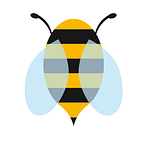Layla
Lauren Clark
The apartment is long, so
if, upon waking, one turns one’s head on the pillow
away from the wall, it becomes possible to see
all the way through the hallway, the living
room, the kitchen, all the way to the stranger
at the counter, where he is placing
a small amount of jam into a bowl of granola and yogurt
for me to eat when I wake. The sight thereof
creates a cereal-bowl-sized hollow
between my ribs. At once I know
two things: one, this hollow
is not necessarily what one would call love. Two,
although this stranger is objectively the only living body in the kitchen
there seem to be several other people in there with him.
They are the other people. I do not know who they are,
I do not yet know who he is, yet he moves
so deftly around them, these invisible holes,
these absent bodies, in his waltz of breakfast.
The distance between him and the bed is also full,
like the final three minutes and fifty-three seconds
of “Layla” are full in their way, after the three minutes
and twelve seconds of organized screaming and tambourines
that precede it:
like traveling down a road in some preternatural darkness —
imagine a benevolent, unalien darkness, if
you can. (An unthreatening darkness.)
(I hope you can.) Imagine a darkness
seen from a train that has stopped
to make way for Canadian freight traffic.
And a small farmhouse with its windows lit is the only light
to punctuate the middle distance. And: you don’t somewhere in your brain
imagine that what lights the house from within is a raging fire
set by the errant cigarette of a passed-out parent. And: no overalled farmer
will come after you waving a quarter bottle of Jack Daniels should you set foot
on his delightfully-lit property. Moreover: you
neither wish to be inside the house nor ever henceforth
without it. You neither believe you would be better off inside it
or wholly beyond its sight. You want the farmhouse
to remain at this fixed distance for ever and ever
because it is not a fixture of distance, because
suddenly your eyes are drawn to the absolute
endlessness of what is around it.
Darkness is to remind you
what you could not see before: that sky
which is elsewhere than the light,
elsewhere than the light, elsewhere
than the light, but is not even its lack.
That low velvet we make
within ourselves: some indistinct,
insensate, totally soundless singing
of nonbirds.
Lauren Clark earned an MFA in poetry from the University of Michigan. Her poetry and translations have appeared in a number of journals, and can be found online in The Journal, DIAGRAM, Phantom Books, and the Offing. She works at Poets House in New York City.
This poem originally appeared in Hayden’s Ferry Review.
Lauren’s current project is a King of That Also, an interdisciplinary event with musicians and artists, “ an hour-long concert of Baroque and contemporary music with accompanying visual projections, and a companion publication that includes works generated in response to the project’s themes. King of that Also is a dynamic interplay of music, text, and visual projections, created by four artists who could only have made it together — it’s a game of telephone in which a single idea is passed from artist to artist. Each of us interpreted the themes of union, connection, and human experience through the lens of our own medium. In this game, however, the pieces build upon each other, fusing into a single work.” The project will eventually produce a book, to be published by Perfectly Acceptable Press in Chicago.
